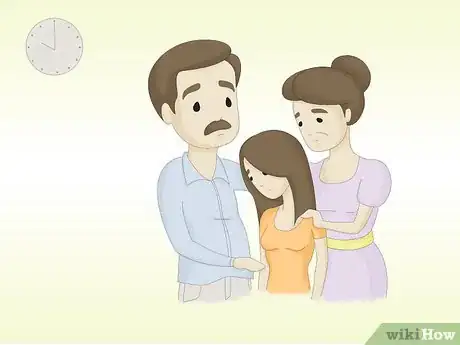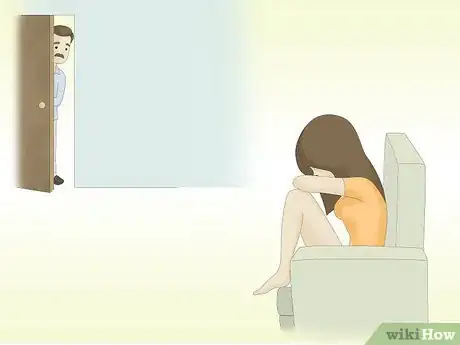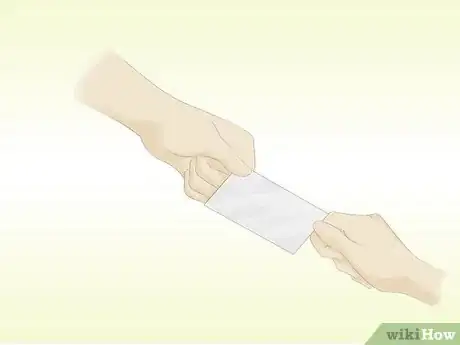wikiHow is a “wiki,” similar to Wikipedia, which means that many of our articles are co-written by multiple authors. To create this article, 12 people, some anonymous, worked to edit and improve it over time.
This article has been viewed 96,224 times.
Learn more...
If your daughter is going through a divorce, it is a harrowing experience for her and it is also difficult for you to see someone you love suffering and doubting their choices about their relationship, as well as potentially losing their faith in their self-esteem and ability to cope. Being there for your daughter is an important part of parenting. This article is suitable for a mother, father, or both parents, who seek to help their daughter survive this challenging time.
Steps
-
1Let her know that you are there for her. Make it clear that no matter what the time of day or night, she has a place to come to if she needs respite, or an ear to talk to if she is in need. When you live far away from her, the phone connection is even more crucial.[1]
-
2Consider the ways in which you might be able to help her tangibly. Think about the sorts of things that might help her through this hard time. Does she need personal space and time to sort through her feelings/papers/household effects, etc. but the kids are underfoot and upset by all the changes? Can you offer to take the kids in for a bit, or at least care for them during periods of time to give your daughter the needed break? Maybe she needs a place to stay, and you can offer that respite. Does she need a loan of money/car/items to get back on her feet or to get out of a difficult situation? Can you offer such a loan? All these practical helps make an enormous difference.[2]Advertisement
-
3Practice active listening. She will be upset, angry, sad, depressed, irritable, relieved, forgiving, and many other emotions at varied times. Be available for her with a compassionate ear and a supportive love that she can rely upon at all times. Even if you're not in a position to physically help her out, you can be there for her emotionally.[3]
-
4Leave out the "I told you so's". Nobody needs a relationship choice thrown back in their face; we love whom we love when do for reasons that are much broader than common sense will ever justify. We make mistakes to learn from them. Your daughter will be experiencing a range of self-talk that will be, for the most part, very negative, such as feeling victimized, angry with herself and at her husband, deeply saddened at the loss, grieving, terrified, feeling stupid and unlovable, etc. None of these are good feelings but with loving support, they will remain temporary. The last thing she ever needs is confirmation of poor choices with the "I told you so's".[4]
-
5Suggest other sources of support without feeling any sense of depletion of your own worth. Being her parent, you are a very important person in her life (or two persons!). All the same, she will need sounding boards beyond you to help her form fully rounded conclusions as to her future movements and needs. If you believe that a counselor or psychologist might be a suitable outlet for her, suggest it. Offer to make arrangements and even pay for it (if you can), just to help her get started. Consider other helpful services too, such as financial consultants, lawyers (for the divorce proceedings/property division), career consultant (if she plans on returning to the workforce), priest or other faith healer, real estate agents, etc. Offer to help with any arrangements and interaction where possible, especially if she seems to lack confidence or is becoming increasingly disorganized as a result of the stress.
-
6Find out the names and details of local support groups for people experiencing divorce or single parenthood. Don't force the issue but do recommend any you believe might help, and simply give her the contact details. Allow her the space to make up her own mind, in her own time. And don't use this as an alternative to your help; rather, such groups become a supporting act to your support.[5]
-
7Feed her well. She may be neglecting eating and drinking properly. Check on her eating and help out by making meals, or arranging them to be delivered during the first weeks of her divorce. This is also especially important where children are involved, even more so if she is depressed and finds it hard, if not impossible, to take care of them in her usual way.
-
8Be a voice of positivity. Although she is going through a terrible time, keep telling her that things will be better and that she has many wonderful opportunities ahead of her. Remind her of her beautiful children, her own incredible skills, her friendliness, her loving heart, etc. Simply because this relationship hasn't worked out does not mean that her future relationships will end the same; remind her that she has learned lessons that will guide her well in the future. Be gentle, always.
Community Q&A
-
QuestionWhat can I do if she loses her child too?
 Community AnswerTry to support her and make sure that she doesn't feel lonely. Be prepared to give her some time, space, and privacy, however; there will be times when she just wants to be alone. You can, bring back some happy childhood memories; this might help her take her mind off of the present.
Community AnswerTry to support her and make sure that she doesn't feel lonely. Be prepared to give her some time, space, and privacy, however; there will be times when she just wants to be alone. You can, bring back some happy childhood memories; this might help her take her mind off of the present. -
QuestionOur daughter doesn't want to open up to us or anyone else. How can we continue to be there for her and show her we love her if she won't talk to us?
 Community AnswerIf the divorce happened recently, you should give her some time to come to terms with it. She may want answers. Ask her if she has questions and answer them honestly but with empathy. Remind her that her parents are always there for her, but don't push her if she needs some space.
Community AnswerIf the divorce happened recently, you should give her some time to come to terms with it. She may want answers. Ask her if she has questions and answer them honestly but with empathy. Remind her that her parents are always there for her, but don't push her if she needs some space. -
QuestionFor how long do I let her stay in denial thinking he'll change his mind before I start employing tough love and using the term "moving on"?
 TheladyorthetigerCommunity AnswerThe sooner she comes to terms with her new circumstances, the better. It will hurt for a while and the pain may never go away completely, but I would encourage you have a talk with her about this right away.
TheladyorthetigerCommunity AnswerThe sooner she comes to terms with her new circumstances, the better. It will hurt for a while and the pain may never go away completely, but I would encourage you have a talk with her about this right away.
Warnings
- If her husband has been violent, your support is crucial to prevent her from falling back into any lies or deception that he might use to try to draw her back. Seek help from women's refuges if you are not able to help out fully. Help her to arrange restraining orders where necessary - have the phone contact details of relevant police officers, social workers, etc. in your phone as well as hers.[6]⧼thumbs_response⧽
References
- ↑ https://www.webmd.com/sex-relationships/features/what-to-do-when-your-children-divorce#2
- ↑ https://www.webmd.com/sex-relationships/features/what-to-do-when-your-children-divorce#4
- ↑ https://psychcentral.com/lib/become-a-better-listener-active-listening/
- ↑ https://www.helpguide.org/articles/parenting-family/children-and-divorce.htm
- ↑ https://www.divorcecare.org/findagroup
- ↑ https://www.womenshealth.gov/relationships-and-safety/domestic-violence/getting-restraining-order


































































